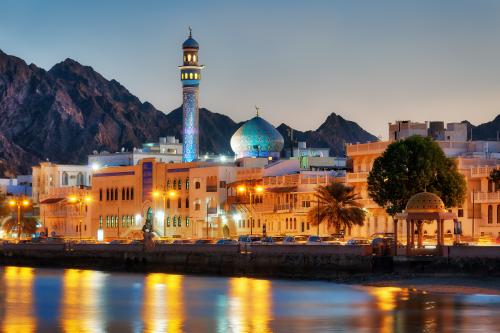 From the GCC to the Black Sea
From the GCC to the Black Sea
Our work in the Middle East, stretching from the Gulf Cooperation Council (GCC) region to the Black Sea and into Africa drives road safety, trade and green mobility and logistics. The IRU RoadMasters and Examiner road safety programmes, the global TIR transit system and the IRU Green Compact decarbonisation roadmap are central to our efforts in the region.
Safe
With a diverse range of terrains and freight compositions, the region presents unique challenges. IRU raises road safety standards by working closely with authorities and operators to apply internationally recognised assessment, training and examination programmes.
IRU also provides technical assistance to governments and international organisations active in the region on formalising and professionalising the road transport sector.
As an example, IRU advised the Togolese government, transport operators and professional organisations on restructuring and redeveloping the country’s road transport sector. This multi-year project, supported by the World Bank, culminated in a completely new transport law adopted by the Parliament of Togo.
Efficient
Efficient transport and trade are crucial for economic growth across the region. IRU optimises trade routes, reducing transit times and cutting costs through innovative solutions.
Central to our work is the continued expansion of the global TIR transit system. By reducing border waiting times and harmonising customs rules, TIR boosts the efficiency and security of transport operations, allowing goods to move faster and more reliably across the region.
The region is increasingly focusing on digitalising cross-border trade. A greater implementation of tools such as eTIR, e-CMR and e-queues is further advancing trade.
Green
Sustainability is a growing priority in the region. Our initiatives focus on reducing the carbon footprint of commercial road transport, bringing international standards and best practice to companies in the region.
Within the broader context of social, environmental and economic sustainability, our decarbonisation work in the region is framed by the IRU Green Compact, the industry-wide roadmap to carbon neutrality by 2050.
Spanning efficiency measures and alternative fuels implementation, IRU activities include targeting emissions for cross-border transports, eco-driver training, and digitalisation to optimise freight movements.
IRU in the Middle East & Africa
In a fast-growing region with much untapped mobility and logistics potential, IRU works with both industry and governments to unleash the power of road transport and trade across the region, focusing on safety, efficiency and sustainability.
Our work in the Middle East, stretching from the Gulf Cooperation Council (GCC) region to the Black Sea and into Africa drives road safety, trade and green mobility and logistics. The IRU RoadMasters and Examiner road safety programmes, the global TIR transit system and the IRU Green Compact decarbonisation roadmap are central to our efforts in the region.
Safe
With a diverse range of terrains and freight compositions, the region presents unique challenges. IRU raises road safety standards by working closely with authorities and operators to apply internationally recognised assessment, training and examination programmes.
IRU also provides technical assistance to governments and international organisations active in the region on formalising and professionalising the road transport sector.
As an example, IRU advised the Togolese government, transport operators and professional organisations on restructuring and redeveloping the country’s road transport sector. This multi-year project, supported by the World Bank, culminated in a completely new transport law adopted by the Parliament of Togo.
Efficient
Efficient transport and trade are crucial for economic growth across the region. IRU optimises trade routes, reducing transit times and cutting costs through innovative solutions.
Central to our work is the continued expansion of the global TIR transit system. By reducing border waiting times and harmonising customs rules, TIR boosts the efficiency and security of transport operations, allowing goods to move faster and more reliably across the region.
The region is increasingly focusing on digitalising cross-border trade. A greater implementation of tools such as eTIR, e-CMR and e-queues is further advancing trade.
Green
Sustainability is a growing priority in the region. Our initiatives focus on reducing the carbon footprint of commercial road transport, bringing international standards and best practice to companies in the region.
Within the broader context of social, environmental and economic sustainability, our decarbonisation work in the region is framed by the IRU Green Compact, the industry-wide roadmap to carbon neutrality by 2050.
Spanning efficiency measures and alternative fuels implementation, IRU activities include targeting emissions for cross-border transports, eco-driver training, and digitalisation to optimise freight movements.
IRU regional office
General Delegate: Erman Ereke
Teşvikiye Mahallesi, Hakkı Yeten Caddesi,
No:13 Terrace Fulya Center-2,
Kat- 10, Daire-55, Fulya, Şişli, Istanbul,
Türkiye
Tel: +90 212 215 60 19
Regional news
Tunis
Driver mobility is necessary to mitigate driver shortages
Cotonou
IRU briefs African governments and industry on road transport reforms
Baghdad
TIR goes live in Iraq in breakthrough for Middle East trade and development
Dubai
Ramadan’s unsung heroes
Doha
Qatar International Safety Centre joins IRU Academy to boost road safety
IRU members in Middle East & Africa
Kabul
ACCI
Baghdad
ALNAQEL
Casablanca
AMTRI
Muscat
ASYAD
Cairo
ATCE
Dubai
ATCUAE
Beirut
CCIABML
Tunis
CCIT
London
DP World
Cairo
FEDCOC
Baghdad
GCLT
Tehran
ICCIMA
Tel-Aviv
IRTB
Tehran
ITCAI
Kuwait City
KIAC
Muscat
MWASALAT
Doha
QCCI
Amman
RACJ
Riyadh
SATA
Khartoum
SATC
Damascus
SNC-ICC
Ankara
TOBB
Ankara
TOBBUND
Baghdad
TRANSFORAT
Dubai
Tristar Transport LLC
Istanbul
UND
Sana'a
YCTA
IRU partners in the Middle East & Africa